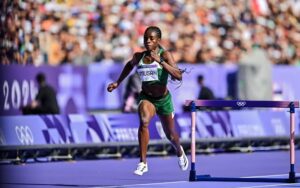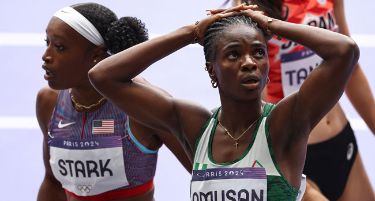In a surprising turn of events at the Paris Olympics, Nigeria’s Tobi Amusan, the current world record holder in the 100-meter hurdles, failed to advance to the final of her signature event. Amusan, who had high hopes of adding an Olympic medal to her illustrious career, finished third in her semi-final with a time of 12.55 seconds, which was not enough to secure her a spot in the final round.
Amusan’s semi-final performance was a tense affair, as she had to wait anxiously for the results of the two other semi-finals to see if her time would be fast enough to qualify as one of the non-automatic qualifiers. However, her hopes were dashed when the athletes in the third semi-final posted quicker times, effectively ending her Olympic campaign.
In the decisive third semi-final, Jamaica’s Ackera Nugent crossed the finish line in 12.44 seconds, securing third place in her heat. France’s Cyrena Samba-Mayela also edged out Amusan by clocking in at 12.52 seconds to take fourth place. Both Nugent and Samba-Mayela’s times were faster than Amusan’s, securing their advancement to the final and extinguishing Amusan’s chances of competing for a podium finish.
This outcome is particularly disappointing for Amusan, who burst onto the global athletics scene in spectacular fashion at the 2022 World Championships in Eugene, Oregon. There, she stunned the world by setting a new world record in the 100-meter hurdles, finishing in a blistering 12.12 seconds.
This achievement not only shattered the previous record of 12.20 seconds, held by American Kendra Harrison since 2016, but it also made Amusan the first Nigerian athlete to hold a world record in an athletics event. Her historic performance was a moment of immense pride for Nigeria, solidifying her status as one of the nation’s greatest athletes.
 In the lead-up to the Paris Olympics, Amusan was considered a strong contender for a medal, with many expecting her to replicate or even surpass her world-record form. However, the nature of high-stakes competition means that even the most accomplished athletes can face unexpected challenges. Amusan’s inability to reach the final serves as a reminder of the unpredictable and often unforgiving nature of the Olympic Games.
In the lead-up to the Paris Olympics, Amusan was considered a strong contender for a medal, with many expecting her to replicate or even surpass her world-record form. However, the nature of high-stakes competition means that even the most accomplished athletes can face unexpected challenges. Amusan’s inability to reach the final serves as a reminder of the unpredictable and often unforgiving nature of the Olympic Games.
For Nigeria, Amusan’s early exit is a significant blow, as she was seen as one of the country’s best hopes for a medal at these Games. With her elimination, Nigeria’s chances of securing a medal have diminished significantly, raising concerns that the nation may leave the Olympics without any podium finishes. The disappointment is palpable, given the country’s rich history in track and field and the high expectations placed on Amusan.
Despite this setback, Amusan’s journey and achievements remain a source of inspiration. Her world record in 2022 was not just a personal triumph but also a monumental achievement for Nigeria, highlighting the nation’s potential in athletics on the global stage. While this Olympics may not have gone as planned, Amusan’s legacy is far from over. She has already cemented her place in history, and there is little doubt that she will continue to be a formidable force in future competitions.
As the Paris Olympics draw to a close, Nigeria will have to reflect on its performance and look ahead to future opportunities for its athletes. For Amusan, the focus will likely shift to regrouping, analyzing her performance, and preparing for upcoming championships where she will undoubtedly aim to reclaim her position at the top of her sport. The road to athletic greatness is often paved with challenges, and how Amusan responds to this moment will be crucial in defining the next chapter of her career.




